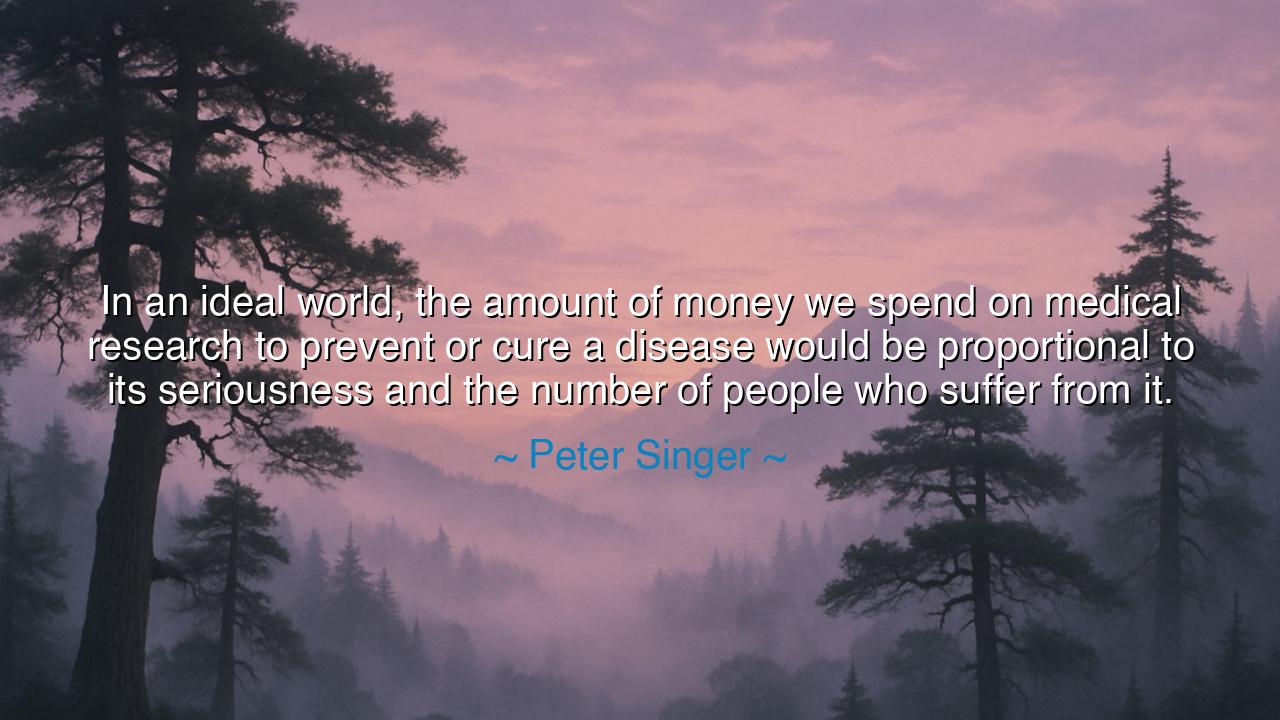
In an ideal world, the amount of money we spend on medical
In an ideal world, the amount of money we spend on medical research to prevent or cure a disease would be proportional to its seriousness and the number of people who suffer from it.






"In an ideal world, the amount of money we spend on medical research to prevent or cure a disease would be proportional to its seriousness and the number of people who suffer from it," declared Peter Singer, a philosopher whose words call upon the wisdom of justice and equity. In the world of the ancients, it was understood that the measure of a society’s strength lies in how it cares for its most vulnerable. The sick, the wounded, and the suffering were not seen as burdens, but as individuals whose needs were sacred. This quote, though spoken in the context of our modern world, echoes a truth as old as time itself—that the resources of a society should reflect the needs of those who suffer most.
Money, the lifeblood of modern civilization, flows through our systems like water, shaping destinies and defining priorities. In the realm of healthcare, the expenditure of money becomes a reflection of our values and compassion. Yet, in many ways, we have strayed from an ideal system where the allocation of wealth is determined not by the power of the rich or the sway of politics, but by the urgency of human need. In ancient times, the treatment of the sick and the care of the vulnerable were moral duties, tied to the very soul of a community. The resources of the tribe or city-state were often marshaled not for grandeur or conquest, but for the care of those in need—whether that be the warriors returning from battle or the elderly and ill who could no longer contribute in the same way.
Peter Singer's words echo the fundamental principle that the most serious afflictions—those that affect the many—should be met with the greatest effort. But we live in a world where often the loudest voices or the wealthiest interests determine where resources are placed. A disease that affects millions, that robs individuals of their health and dignity, might receive only a fraction of the attention or funding compared to conditions that are less common but perhaps more visible or politically expedient. The treatment of such imbalances is not only a matter of fairness but of wisdom—for how can a society call itself just when the suffering of the many is ignored in favor of the loud demands of the few?
Consider, for instance, the story of the plague that ravaged Athens in 430 BC, as recounted by Thucydides. The city was struck by an illness that killed a quarter of its population, including many of its leaders. Despite the urgency of the epidemic, resources were slow to mobilize, and the response from the state was disorganized. The Athenians were faced with the moral dilemma of how to allocate their limited resources—resources that were stretched thin due to the long-running war with Sparta. The suffering was immense, and yet the response was tragically insufficient. In this ancient lesson, we learn that when the collective good is neglected, the society as a whole begins to unravel. Just as the Athenians failed to act swiftly in their moment of crisis, so too do we fail when we allow the prioritization of wealth and power to determine the focus of medical research.
In contrast, we have the example of the smallpox vaccine, which emerged in the 18th century. Though smallpox was a disease that affected millions, causing untold suffering and death, it was not until a worldwide effort was made that the disease was eradicated. The allocation of resources to research, vaccination, and global cooperation proved to be a profound act of solidarity. The eradication of smallpox stands as a shining example of how collective action—rooted in the belief that all human life is of equal value—can produce life-saving results. This monumental effort reflects the ideal of which Peter Singer speaks, where the resources dedicated to preventing or curing diseases are proportional to their severity and reach.
Our lesson, then, is clear: We must prioritize those who are most in need, recognizing that the greatest suffering demands the greatest care. In a world where too often the loudest voices and the deepest pockets determine what is worthy of our attention, we must remain steadfast in our commitment to equity. This means channeling our resources, our research, and our collective will toward those diseases that affect the many, that take the greatest toll on humanity. It means embracing the moral duty to support the most vulnerable and ensuring that the weight of our efforts is proportional to the depth of their pain.
Thus, let us follow the wisdom of the ancients and the vision of Peter Singer, and let our actions reflect a deeper understanding of justice. May we work toward a world where the suffering of the many is met with the resources and care it deserves, where medical research becomes a reflection of our highest values, and where no one is left behind in the pursuit of healing. For in the care of the suffering, we find the true measure of our civilization.






AAdministratorAdministrator
Welcome, honored guests. Please leave a comment, we will respond soon